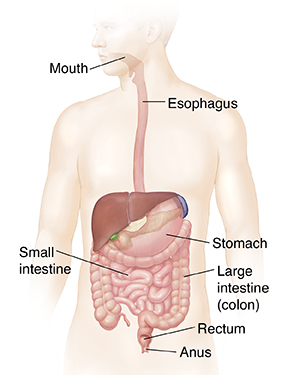What Is Crohn's Disease?
Crohn's disease causes swelling, inflammation, and irritation in the digestive tract. It's a form of inflammatory bowel disease (IBD). It often affects the small intestine and the colon. All layers of the lining of the digestive tract may be affected.
While this disease has no cure, the symptoms can be treated. Follow your healthcare provider’s advice to help manage your symptoms. Also stay away from foods that cause irritation.
 |
| Any part of the digestive tract, from the mouth to the anus, can be affected by Crohn's disease. It is mostly found where the small intestine and colon meet. |
 |
| Crohn’s disease can affect all the layers of the digestive tract. |
Symptoms of Crohn's disease
-
Belly pain and cramping
-
Urgent need to move the bowels or a feeling of not fully emptying them
-
Constipation
-
Fever and chills
-
Loss of appetite, possible weight loss
-
Bloody or persistent diarrhea
-
Nausea or vomiting
-
Joint pain
-
Skin rashes and ulceration
-
Eye inflammation
-
Severe tiredness (fatigue)
-
Anus problems, such as tears or ulcers
-
Infection (abscess) or abnormal opening in the digestive tract (fistula)
Your treatment choices
Your healthcare provider will talk with you about your treatment choices. They may include medicines, lifestyle changes, surgery, or a combination of these. Treatment helps you stay as active as you want to be. Keep in mind that Crohn's is a chronic illness. That means it can’t be cured. But treatment may ease symptoms. And you can still live a full life.
Medicines
Certain medicines can help your symptoms, such as:
-
Medicines to control your body's immune system, such as 6-mercaptopurine or azathioprine
-
Corticosteroids (for short-term use) to help reduce inflammation
-
Antibiotics to fight bacteria, if there is an infection
-
Biologics (anti-TNF and others), which are injected
Lifestyle changes
Certain foods can make symptoms worse. You may need to change what you eat. Don't eat foods that make your symptoms worse. These foods vary from person to person. But high-fiber foods (such as fresh vegetables) and high-fat foods (such as dairy products and red meat) cause symptoms in many people. Keep track of foods that cause you problems.
To a lesser degree, stress may make symptoms worse. Reducing stress may help. Relaxation exercises, certain medicines, and deep breathing can help you control stress. Your healthcare provider may be able to tell you more about these.
If surgery is needed
Surgery may help control Crohn's, easing your symptoms. Surgery can remove a severely affected part of the digestive tract. If this is a choice for you, talk with your healthcare provider. Keep in mind that surgery isn't a cure for Crohn's. You will still need to see your healthcare provider after surgery for follow-up care and monitoring. You may need more treatment and testing.